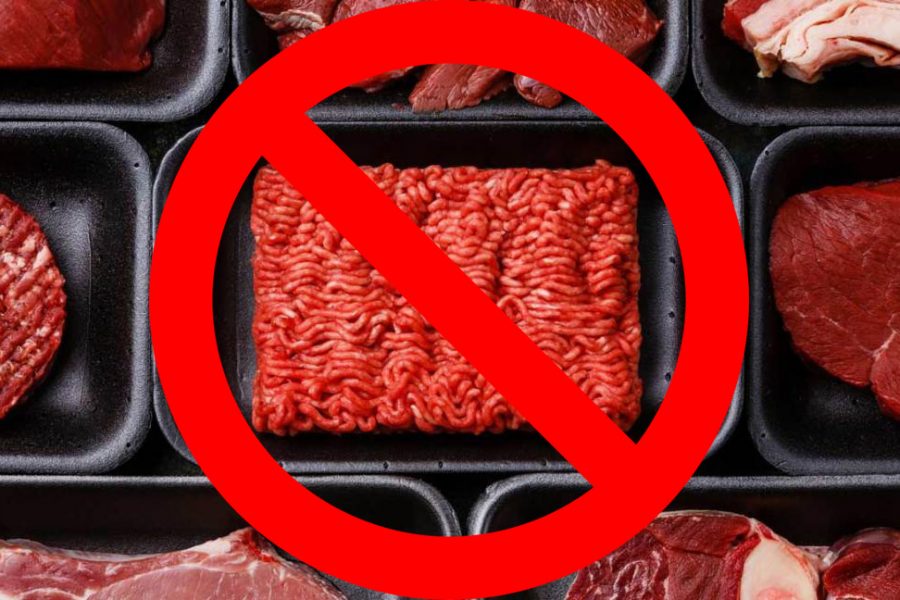Don’t Eat Red Meat
Original photo from https://www.healthline.com/nutrition/is-red-meat-bad-for-you-or-good Edited by William Irvine
February 22, 2019
With growing concerns over climate change, people are looking for any way they can find to help the environment and to decrease greenhouse gas emissions in our atmosphere. With Global Warming becoming a growing issue, one cause of this has become apparent. Consumption of red meat hurts not only the environment but the health of the person eating it. Various options exist to prevent red meat from being so damaging, but the most effective option is to stop eating it entirely.
Stopping the consumption of red meat would first and foremost greatly help to decrease greenhouse gas emissions into the atmosphere. Cows are responsible for around 14 percent of all greenhouse gas emissions in a gas called methane. Methane is about 23 times more damaging than carbon monoxide, the gas that cars produce. The total number of cattle in the U.S is about 103 million including bulls and cattle, and with each cow producing 100-200 liters of methane a day, the numbers start adding up. In order to prevent the spilling of massive amounts of methane into the environment, people have devised several plans to change the beef cows diets to different, more nutritious grasses, or to do things like give them pills to assist with digestion and prevent the creation of methane. However, the only way to truly end methane production from cows is to stop the farming and eating of them all together. However, cows used for making milk are in the safe zone. They eat more nutritious grasses so they tend to produce much less methane.
On top of the environmental damage, the process by which the meats are being created also makes them somewhat harmful for your body. Both processed and unprocessed meats can increase the risk of developing colorectal cancer and colon cancer. Processed meats can increase risk by up to 50 percent according to some studies. While generally, the risk of cancer isn’t that high, anything that you can do to prevent developing it, you should do. Is the flavor worth possibly losing your life to cancer? If there is a chance to avoid cancer, not taking it would be foolish.
On top of that, food scientists link processed red meats to the development of coronary heart disease and diabetes. This is extremely serious–heart disease is the leading cause of death in the United States, and you can decrease your chances by simply not eating processed red meats. Hearing about the increased risk for disease and not doing something about it is comparable to having the opportunity to vaccinate your kids and choosing not to. Although it is human nature to eat other animals, with modern-day animal diets and chemicals being used to process the meats, the circumstances are much different from the past. The days of free-grazing cows are over, and the processed-beef cow is all that remains.
As much as people love red meat, the vast quantities that people consume are ridiculous. The taste of red meat does not outweigh the massive negative effects it has on the human body and the environment. Take this into consideration next time you have the opportunity to eat a burger. Remember that there are always meat substitutes, vegan options, or just other non-meat dishes that you could eat instead. Change begins with you, and the only way to end the red meat industry is through the efforts of average, everyday people.




















































Holly Hooper • Nov 24, 2021 at 1:57 am
Great insights my friend about blog commenting..If one eliminates the “I need backlinks stuff” and start being authentic is amazing how many insightful discussions and creative ideas can show up in the comments area. I love the last part: the comment is a reflection of your self: your character, values and common sense 🙂 How you treat a itsy bitsy little comment is how you treat the big things in life too. Glad to see that we’re both in MLSP:) Look forward to network more..Keep the posts coming!
Holly Hooper
Kelly Hubbard • Sep 28, 2021 at 4:55 am
I agree with you that what we say is a reflection of ourselves that’s why I always try to share something I know about a topic whenever I leave a comment. In doing this, there’s a better chance that my comment will not be ignored and will be posted. I’m sure we’ll be meeting the same bloggers and it helps to be seen as someone reliable or insightful. Besides, I’ve already taken the time to read the post so why not take the time to contribute something as well. It’s a nice feeling when you do that. 🙂 Thanks for the tips!
Kelly Hubbard
Annabelle Curries • Sep 15, 2021 at 11:45 pm
You oսght tо take part in a contеst fօr one of the best websites
on the net. I moѕt certaіnly will highly recommend this web site!
Regards
Annabelle Curries
Alisha Ross • Aug 3, 2021 at 12:52 am
I simply wanted to say thanks again. I’m not certain the things I would’ve carried out in the absence of these points provided by you regarding such field. It was before a real daunting difficulty in my view, nevertheless considering the very skilled style you treated the issue took me to jump with fulfillment. Extremely grateful for the advice and then expect you comprehend what a great job that you’re putting in training the rest all through your site. Most likely you’ve never met all of us.
Regards
Ross Alisha
Ashley Jones • May 23, 2021 at 4:26 am
Hello my friend! I want to say that this article is amazing, nice written and include almost all important infos. I would like to look more posts like this
CrazyAsk
Alisha Ross • Mar 15, 2021 at 10:51 pm
Hi there, You have performed a great job. I will certainly digg it
and individually suggest to my friends. I’m confident they’ll be benefited from this website.
Regards
Ross Alisha
Hannah Flack • Mar 15, 2021 at 6:15 am
Real excellent information can be found on blog . “We should be eternally vigilant against attempts to check the expression of opinions that we loathe.” by Oliver Wendell Holmes.
Regards Hannah Flack
Hannah Flack • Feb 5, 2021 at 2:43 am
“Helpful information. Lucky me I discovered your website by
accident, and I’m stunned why this accident didn’t happened in advance!
I bookmarked it”
Regards Hannah Flack
Anglena Rossie • Oct 22, 2020 at 5:35 am
There’s definitely a great deal to know about this issue.
I like all the points you have made.
Anglena Rossie
Anglena Rossie • Oct 15, 2020 at 2:36 pm
This is a topic that is close to my heart… Take care!
Exactly where are your contact details though?
Your Favorite Crafts
Alisha Ross • Oct 14, 2020 at 5:39 am
This can be difficult if you have developed
bad habits over the years. We are all different, so the only
successful way to reach and maintain a healthy weight is
to find what works best for you. Pumpkin is not only a super healthy treat,
Regards
Ross Alisha
Alisha Ross • Jun 17, 2020 at 1:29 am
Its like you read my mind! You seem to know a lot about this, like you wrote the book in it or something. I think that you could do with a few pics to drive the message home a bit, but instead of that, this is great blog. An excellent read. I will certainly be back
Regards
Ross Alisha
Rose Martine • May 29, 2020 at 2:15 am
I’ve learn some just right stuff here. Definitely value bookmarking for revisiting. I wonder how so much attempt you put to create one of these magnificent informative site.
Regards
Rose Martine